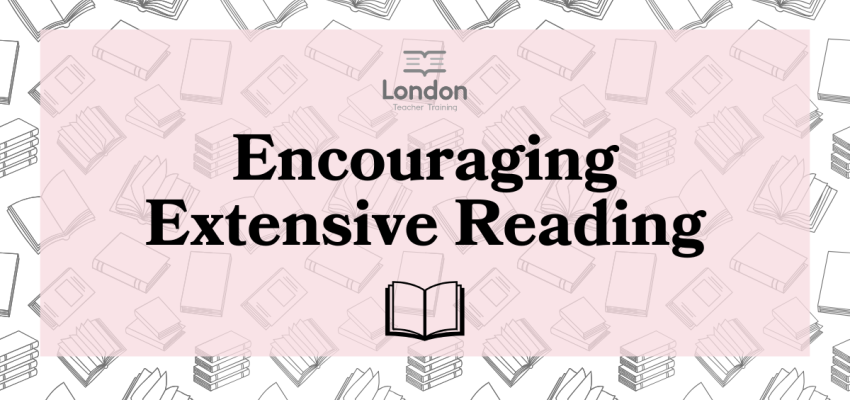Monday, March 31, 2025

The benefits of extended reading are indisputable from many perspectives. Research has shown that when students read for the sole purpose of enjoying reading, the benefits include significant gains in reading skills, increased vocabulary, increased confidence, lots of exposure to the language, increased cultural awareness, preparation for longer texts in exams, exposure to a wide variety of texts and, above all... the fact that it is fun!
It seems, then, that implementing an extensive reading programme will bring many benefits to our students. However, their attitude towards reading, especially among teenagers, is rather negative. The habit of reading seems to be getting less and less popular and motivating them to read a book is not always an easy task. For this reason, it is important to take into account the basic requirements that an Extensive Reading programme should fulfil, according to Day and Bamford[1]:
One of the main conclusions that can be drawn from this list is that reading should be as far away as possible from the classic classroom reading, i.e. reading texts with the aim of developing specific skills, such as reading for gist or reading for detail. Reading in class seems to be at odds with the pleasure of reading and this surely contributes to the negative attitude students have towards reading for pleasure. Reading? Pleasure? Contradictory terms for most of them.
In our daily lives we have to read a certain number of documents that bore us to death. Very often this happens because we read them out of obligation: rarely will anyone choose to read a text that will bore them or that they will not like. The same principle applies to students; it is important that they can choose the texts they want to read. Of course, not all schools have the capacity to have a well-stocked library of titles of different genres to suit the different tastes of the students. However, nowadays the internet offers a wide variety of websites that provide free reading texts for students to enjoy, including www.er-central.com , www.freegradedreaders.com or https://learnenglishteens.britishcouncil.org/study-break/graded-reading.
Another key factor in the success of an Extensive Reading programme is that the chosen readings shouldn’t be too challenging. If students are constantly having to look up words they do not understand, they are unlikely to enjoy reading. Of course, this is not to say that there is no value in students having to look up the meaning of words in context, but this should not constantly interfere with reading comprehension, as we are unlikely to enjoy something we do not understand.
The role of teachers is crucial in an extensive reading programme. Unless students are given clear guidance on what kind of texts to choose, how much time they should spend reading or the time they have to read a particular text, most will give up reading sooner or later. It is the teacher's job to ensure that the reading programme is not only extensive, but that it also extends over time.
One of the points in Day and Bamford's[2] list can be somewhat problematic when implementing an extensive reading programme: reading is the reward itself. In an ideal world this would probably be the case, and students would read for the sheer pleasure of reading. However, this rarely happens, and certainly not for long. For this reason, it has been suggested that an extensive reading programme should be monitored and assessed. On the one hand, it seems logical that such a programme should be monitored, but on the other hand the fact that it is assessed deprives it of precisely the basis on which such a programme is built. If students feel that they are reading to meet certain assessment requirements, they are likely to use some sort of help, like AI programmes to write a summary and from the outset, have no intention of ever finishing the book.
And since the best way to convince someone that something works is through personal testimony, here is mine. A couple of years ago, a B1 student showed a great interest in fantasy novels from the very beginning of the year and was a big fan of Harry Potter. One of her great motivations was to be able to write a letter to J.K. Rowling to tell her how much she admired her and, from time to time, she would ask questions about how to say certain expressions in English with the intention of impressing her when she sent the letter. That student is three years later at a C1+ level, surprising her teacher with expressions she hasn't seen in class and getting brilliant results in the reading part of the Cambridge Proficiency exam.
Extensive reading programmes work if we can motivate students. Students' attitudes towards reading are a determining factor in the success of such programmes and one of the most important responsibilities of the teacher is to motivate them. Unless the teacher shows genuine enthusiasm for reading, students are unlikely to believe that reading is one of the most fascinating experiences they will ever have in their lives and that it will open doors to worlds they never even suspected existed. A successful extensive reading programme is, in short, our chance to change their lives forever.
[1] EXTENSIVE READING IN THE SECOND LANGUAGE CLASSROOM, Richard R Day and Julian Bamford Cambridge: Cambridge University Press, 1998
[2] EXTENSIVE READING IN THE SECOND LANGUAGE CLASSROOM, Richard R Day and Julian Bamford Cambridge: Cambridge University Press, 1998